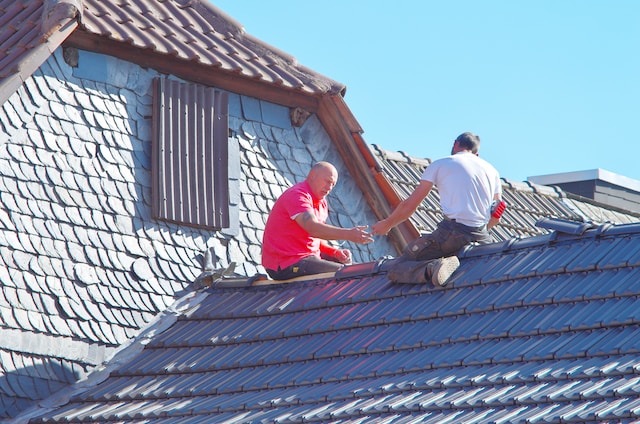As the old saying goes, “A stitch in time saves nine”, and when it comes to roofing damage, those nine could be thousands of dollars. To ensure that you’re not stuck footing an unexpected bill due to neglecting something that started out as minor damage, it pays to stay ahead of the game and know how to spot telltale signs from the outset. But what does roofing damage look like?
And how can you differentiate between actionable issues versus more benign matters? We will answer these questions right below and walk you through a comprehensive guide on detecting early warning signs of your home’s looming roofing crisis before it’s too late!
Check for visible water damage
As a homeowner, you must keep an eye out for any signs of water damage in and around your property. An area to check for is near downspouts or eaves, as they can often be the source of leaks and water buildup.
When left unchecked, water damage can lead to costly repairs and even compromise the structural integrity of your home. But, if you are from Pennsylvania, you can take advantage of local roofing contractors like Triple R Roofing in Hanover — these professionals offer expert solutions for all your roofing needs. From repairs to replacements, an experienced team can help you protect your home from the damaging effects of water.
Inspect for any missing shingles or cracked tiles
Exposed roofing nails, also known as “shiners”, are a less obvious yet critical sign to look out for. Roofing nails should ideally be covered with shingles, but weather and various factors can result in them becoming exposed. The problem with shiners is that they can rust over time, specifically in wet climates.
Once a nail rusts, it can corrode, leading to small leaks that can escalate into significant problems. For this reason, you want to regularly inspect your roof for shiners, especially after severe weather conditions. If you notice any exposed nails, it’s crucial to get them covered promptly to prevent potential water damage.
Look for signs of mold or mildew on your roof
Mold and mildew are among the most dangerous and subtle signs of roofing damage. These harmful fungi thrive in moist environments and can rapidly grow unnoticed beneath your roof tiles. A roof with mold or mildew will likely display black streaks or spots. If you spot such signs, it’s imperative to act fast, as these fungi can deteriorate your roof’s structure and potentially cause health issues for your household.
Mold and mildew can also indicate water damage, so their presence should prompt a thorough inspection of your roofing system. If you’re unsure, consult with a roofing professional to assess the situation.

Look for dark spots on the ceiling
It’s easy to overlook the ceiling when checking for signs of a leaking roof, but it’s important to give it a thorough inspection. One telltale sign to look for is dark spots or discoloration on the ceiling. These spots can indicate water damage caused by a leaky roof, and ignoring them could lead to even more costly repairs down the line. If you notice any dark spots on your ceiling, it’s best to call in a professional to assess the situation and determine the best course of action. Don’t let a small leak turn into a big problem – keep an eye out for potential issues and address them promptly.
Check any cracks in the flashing around chimneys and skylights
A cozy fireplace or a skylight that lets the sun shine in can often be the highlights of a home. But as sturdy and reliable as they may seem, even the most robust chimneys and skylights can wear over time. In both cases, you need to pay close attention to the flashing around them, as these metal strips are responsible for keeping water away from vulnerable areas. If you’re not sure where to start, consider calling in a professional for an inspection to ensure your home stays safe and secure.
Ensure that the gutters are clear of debris
Gutters play a pivotal role in the health of your roof and the overall drainage system of your home. A blocked gutter laden with leaves, pine needles, or other debris can cause water to overflow and seep into your home’s foundation, leading to potential water damage.
In freezing climates, the trapped water can freeze and cause ice dams that exert unnecessary weight and pressure on your roof. Therefore, it’s mandatory to keep your gutters clear and well-maintained. Regular cleaning, preferably in the fall and spring, can prevent these issues and prolong the life of your roof.
Maintaining your roof‘s health goes beyond just enhancing your home’s curb appeal. It’s a critical aspect that safeguards the structural integrity of your home and the well-being of its inhabitants. By staying vigilant to the early warning signs of roof damage, you can ward off substantial damage and costly repairs. Regular inspections can further ensure your roof’s longevity and your peace of mind. Remember, a well-kept roof is synonymous with a safe, healthy, and happy home.

